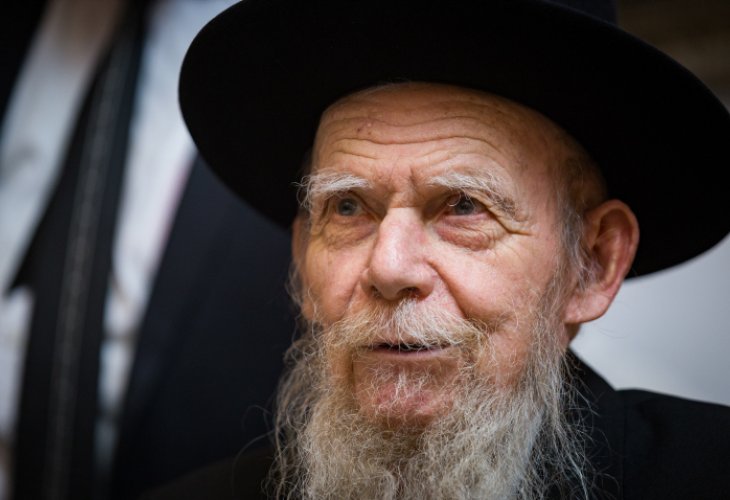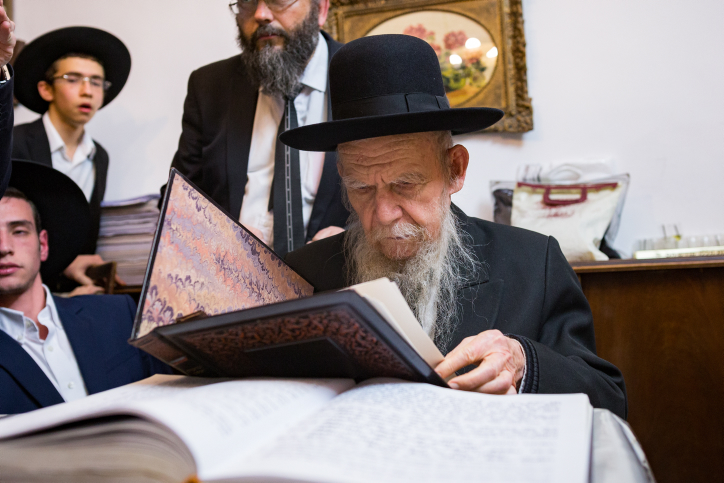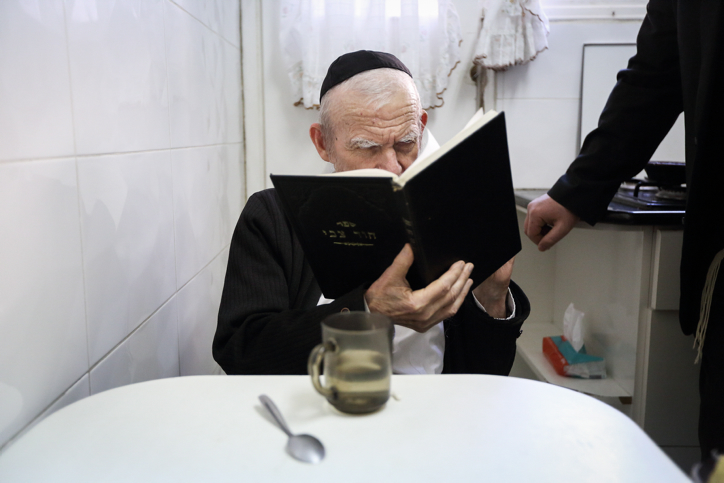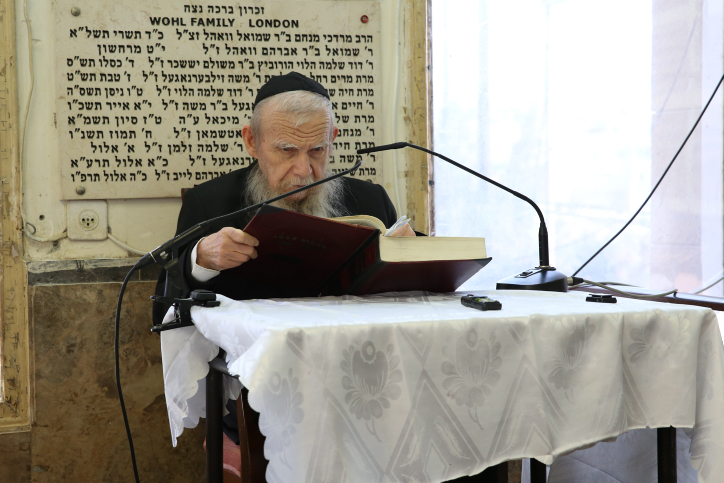Rabbi Gershon Edelstein: A Captivating Portrait of the Lithuanian Leader
Rabbi Gershon Edelstein ascended to Israel with his brother on a ramshackle ship, studied on top of orange crates, and as a young man was among the first six students at Ponovezh Yeshiva. After Rabbi Shteinman's passing, he was the only one to eulogize him at the funeral. A captivating profile of the Lithuanian leader.
 Rabbi Gershon Edelstein (Photo: Aharon Krohn/Flash90)
Rabbi Gershon Edelstein (Photo: Aharon Krohn/Flash90)Rabbi Gershon Edelstein did not require a formal coronation ceremony to announce that he was chosen to be the successor of the great leader Rabbi Aharon Yehuda Leib Shteinman, zt"l. For the Lithuanian sector, it was only natural, as in recent years he had already served on various occasions as Rabbi Shteinman's replacement, and Rabbi Shteinman himself had expressed several times that Rabbi Edelstein was to inherit his position.
Even over the past year, during periods when Rabbi Shteinman was hospitalized or too weak to attend various meetings, decisions were entrusted to Rabbi Edelstein (Reb Gershon to his students), and the Knesset members from Degel HaTorah would frequently visit his home.
The Rabbi Brothers
The 94-year-old Rabbi Edelstein, who has led the esteemed Ponovezh Yeshiva in recent years, dedicates nearly 18 hours a day to his studies and receives hundreds of people daily for audiences, did not reach his status overnight. Many years of effort and toil accompanied him.
He was born in 1923 in the Soviet Union, in the town of Shumyats near Smolensk, to his father Rabbi Tzvi Yehuda Edelstein and his mother Miriam. He is the eldest in his family, his younger brother was Rabbi Yaakov Edelstein, zt"l, the Rabbi of Ramat Hasharon who passed away last year, and his sister is Mrs. Pesia Gershonovich, whose husband served as the Rabbi of Netivot until his passing.
The Edelstein family faced difficult years in the Soviet Union. When Reb Gershon and Reb Yaakov were young children, their mother acquired fake birth certificates for them so they would be registered as several years younger than their actual age. She hoped it would prevent them from having to attend communist school.

Reb Gershon lived for a time with his brother at an aunt's house in the city of Klimovich, where they secretly studied Torah. After several years, they received the harsh news – their mother had passed away from typhoid, and their father informed them that they had to return home because he had obtained an exit visa to Israel. So, along with their grandmother, they boarded a dilapidated ship from Odessa to the Holy Land.
The small family initially settled in Jerusalem, where they lived for about six months, eventually making their home in Ramat Hasharon. Since there was no religious school for the two brothers in the city, their father taught them Gemara at home as they sat on orange crates. He also hired a tutor to teach them secular subjects like grammar, mathematics, and English, which were very important at the time, with English even being considered an official language in Israel.
A year after their arrival in Ramat Hasharon, their father was chosen as the city's Rabbi, and at the beginning of the Elul term, the two brothers began studying at Lomza Yeshiva in Petah Tikva. A year later, their father instructed them to return home because he had remarried, claiming that now the household burden would not fall on them, and they could study quietly with him. Indeed, the three studied together, and as the brothers testified years later, it was the sweetest and most productive learning experience one could have.
A few years later, when Ponovezh Yeshiva was established, they were asked to join its students and were among the first six students there. Shortly after joining, Rabbi Gershon was appointed by Rabbi Yosef Shlomo Kahaneman, the founder of the yeshiva, to oversee the study of young students who came from Europe after the Holocaust. A few years later, he was given another position - to deliver lectures to young yeshiva students. During that period, the two lived in the home of Rabbi Michel Yehuda Lefkowitz, who rented out his only bedroom to yeshiva students.

In 1948, Rabbi Gershon married his wife Chania Rachel (who passed away about 15 years ago), and they had four sons and three daughters, with many grandchildren and great-grandchildren born over the years. Many of their descendants now serve as heads of yeshivas and important lecturers.
In 1950, Rabbi Tzvi Yehuda Edelstein passed away to the next world, and Reb Gershon was uncertain whether to take on the role of Rabbi of Ramat Hasharon, but since he already had a position at the yeshiva, the role was ultimately given to his brother, Rabbi Yaakov Edelstein, zt"l.
Adapting to the Student
Since Reb Gershon arrived in Israel, he has never traveled abroad, not even for outreach missions. According to his close associates, his daily schedule is generally fixed: he awakens shortly after five in the morning, prays at the yeshiva near his home, eats breakfast (half a slice of whole wheat bread and some vegetables), then goes to circumcision ceremonies in Bnei Brak where he is invited to serve as the sandek, and learns until noon. At noon, he gives his regular class at the yeshiva, then has a cooked lunch, and at three-thirty, opens his home to receive people for forty minutes. Afterward, he returns to his studies until midnight, with a short break for dinner. For the past eighty years, he hasn't consumed any sweet foods, and when he's thirsty, he only drinks boiled water. He often mentions the 'Rambam diet' as a way of life.
From an educational perspective, Rabbi Edelstein recommends that study methods align with each student's nature. His prevalent argument is that when the study style fits the student's character, he feels more satisfaction, making it easier for him to sustain his studies over time. He also often recommends learning at a fast pace, covering many pages. Additionally, Rabbi Edelstein encourages educators to form a personal connection with their students, as this is the foundation for educating children to love Torah.
In one of his speeches at an independent education conference, he noted: "It is very important that the educational relationship with the student involves not just words of Torah, but also asking about their situation and what they are experiencing at home because it is important they feel cared for." The Rabbi emphasized that this applies to 'regular' and 'disciplined' children as well. "Because it is important even for such children to feel they have a good connection with their educators."

Rabbi Edelstein is also considered a fervent supporter of religious educational networks and schools focused on outreach. "The moment a child learns in a school purely dedicated to holiness, it affects the entire family, and everyone receives values of love for Torah and commandments, things of immeasurable importance."
On different occasions, Rabbi Edelstein has referenced the verse: "Loving all creatures and bringing them closer to Torah," explaining that no student can be brought closer to Torah before being genuinely loved, and therefore, the duty of the educator is first and foremost to love their students.
"Do Not Be Angry with Secular Jews, Only Pity Them"
Rabbi Edelstein often discusses with his students the combination of Torah with practical life, often citing this story: There was a scholarly young man deep in his studies who never engaged in idle chatter, and upon returning home, would eat and rest before immediately returning to his learning. This young man came to realize that this was not the proper path and he should also take an interest in his family's well-being and give them the attention they needed, and indeed he did so, and his life became wonderful. "This is exactly how one should behave," Rabbi Edelstein emphasized in his talks, "and it is especially important to devote time to the wife, as the sages said that women possess nine measures of speech and need someone to converse with them."
About five years ago, Rabbi Edelstein made a surprising statement regarding secular individuals who do not observe commandments and serve in the army. He stated very clearly: "If they risk their lives to save others out of love for humanity, they have a world to come just like the martyrs of Lod." For those unfamiliar, the martyrs of Lod were two brothers who gave up their lives to save all the residents of the city. This occurred when a king's daughter was found dead in Lod, and her father decreed that if the murderer was not found, all the Jews would be killed. Those brothers claimed they were the murderers, even though they were not, to save everyone, and the sages said: "The martyrs of Lod have no one who can stand in their place."

Last year, during a period of significant incitement against the ultra-Orthodox community, Rabbi Edelstein responded in one of the lessons held at his home, saying that "the campaign of incitement is a heavenly decree, and if it were not carried out by the secular community, it would have occurred in another way." He also emphasized the severity of the incitement arising from baseless hatred and cited the story of Kamtza and Bar Kamtza, whose baseless hatred led to the destruction of the Temple. "We need to know this is our duty to improve our ways," he said, "and in any case," he emphasized, "there is no reason to hate the secular people; we should only pity them."
He often remarks on those who leave the faith and drop out, referring to them as 'captured infants.' He calls for avoiding pushing them away from home and urges treating them with respect, even offering financial support. "We must do everything possible to bring them back to their families," Rabbi Edelstein stressed.
With Persistence and Determination
Rabbi Shteinman's regard for Rabbi Edelstein was visible over fifteen years ago. Rabbi Shteinman's son once recounted that during the Ten Days of Repentance, he went to the evening prayer, but his father, Rabbi Shteinman, halted him and instructed him: "Rosh Yeshiva Reb Gershon is here, so when you finish, wait for him, and under no circumstances wait for me." This conveyed the message that he waived his honor to honor Rabbi Edelstein.
Regularly, Rabbi Shteinman recommended young men attend Rabbi Edelstein's lectures because "one can gain much in understanding Torah there." Even for his scholarly work ‘Ayelet Hashachar’, he chose Rabbi Edelstein for reviewing. It is no wonder that at Rabbi Shteinman's funeral, Rabbi Gershon Edelstein was the only one to deliver words and eulogize him.
In fact, as those close to him testify, there are no significant differences between him and Rabbi Shteinman. Rabbi Edelstein is also relatively moderate in his views. For example, regarding the issue of Shabbat, which recently made headlines, he urged the ultra-Orthodox Knesset members not to threaten withdrawal from the coalition, but on the other hand, instructed them to change the law and thus prevent Shabbat desecration without radical statements and without unnecessary declarations. Generally, Reb Gershon maintained direct contact with Rabbi Shteinman over the past decades and consulted him frequently. "We consulted on the subjects of the lessons, the manner of teachings at the yeshiva, and many other matters," he recounted on various occasions. Perhaps this is why their views are very similar on many subjects.
Yet, unlike Rabbi Shteinman, he is a more aloof type, perhaps even stern, and this works to his advantage with the numerous responsibilities currently presented to him. Nevertheless, due to the many authorities now assigned to him, his associates fear he might have to stop giving his lessons at the yeshiva and instead dedicate himself fully to serving the people of Israel. Undoubtedly, he will continue Rabbi Shteinman's style of leadership, achieving outcomes through wisdom, love, and dialogue.

